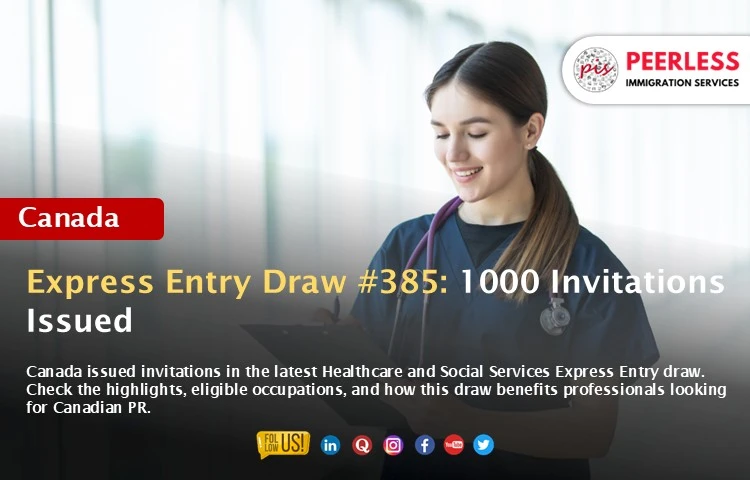
In-Demand Occupations for Permanent Residency in Australia, Canada, and Germany - 2025
As global economies evolve, skilled migration remains a cornerstone for countries like Australia, Canada, and Germany to address labor shortages and drive growth. For professionals seeking permanent residency (PR) in 2025, targeting in-demand occupations can significantly boost your chances of success. At Peerless Immigration Services, we specialize in guiding skilled professionals through the complex immigration processes of these nations. This blog explores the top in-demand occupations for PR in Australia, Canada, and Germany in 2025, key visa pathways, including the Germany Opportunity Card, and how our expertise can help you achieve your migration goals.
Why Choose Australia, Canada, or Germany for PR in 2025?
These countries are renowned for their high quality of life, robust economies, and immigrant-friendly policies. Here’s why they stand out:
- Australia: With a points-based system and the Core Skills Occupation List (CSOL), Australia prioritizes skilled workers in healthcare, IT, and construction to meet its growing infrastructure needs.
- Canada: The Express Entry system and Provincial Nominee Programs (PNPs) target professionals in healthcare, technology, and skilled trades, with over 500,000 job vacancies reported in May 2025.
- Germany: The Opportunity Card and Blue Card programs attract engineers, IT specialists, and healthcare professionals to address labor shortages in a thriving economy.
In-Demand Occupations for PR in 2025
Australia: Core Skills Occupation List (CSOL) Highlights
Australia’s immigration system focuses on filling skill shortages through the Skilled Independent Visa (Subclass 189), Skilled Nominated Visa (Subclass 190), and Skills in Demand Visa (Subclass 482). Key in-demand occupations for 2025 include:
- Registered Nurses: High demand due to an aging population and expanding healthcare needs.
- IT Professionals: Software engineers, cybersecurity analysts, and data analysts are critical to Australia’s booming tech sector.
- Engineers: Civil, mechanical, and electrical engineers support infrastructure and renewable energy projects.
- Skilled Trades: Carpenters, electricians, and plumbers are essential for construction and housing projects.
- Teachers: Secondary school teachers, especially in STEM subjects, and early childhood educators are highly sought after.
Canada: Express Entry and PNP Opportunities
Canada’s Express Entry system, including the Federal Skilled Worker Program (FSWP) and Federal Skilled Trades Program (FSTP), prioritizes professions based on the National Occupational Classification (NOC) TEER 0, 1, 2, and 3 categories. In-demand roles for 2025 include:
- Healthcare Professionals: Registered nurses, nurse practitioners, and allied health professionals are critical to Canada’s healthcare system.
- IT and STEM Professionals: Software engineers, data scientists, and information systems specialists are in high demand.
- Skilled Trades: Welders, electricians, and plumbers are targeted for infrastructure and renewable energy projects.
- Accountants: Essential for businesses, with eligibility through FSWP and Canadian Experience Class (CEC).
- Social Workers: Prioritized in category-based Express Entry draws, particularly in Ontario and British Columbia.
Germany: Opportunity Card and Blue Card Opportunities
Germany’s immigration policies, including the Opportunity Card (Chancenkarte) and EU Blue Card, focus on professionals with qualifications recognized in Germany. Top occupations for 2025 include:
- Engineers: Mechanical, electrical, and civil engineers are needed for industrial and infrastructure projects.
- IT Specialists: Cybersecurity analysts, software developers, and network engineers are in high demand.
- Healthcare Professionals: Doctors, nurses, and aged care workers support Germany’s healthcare system.
- Construction Managers: Essential for urban development and infrastructure expansion.
- Skilled Trades: Electricians and welders are critical for manufacturing and construction sectors.
Key Visa Pathways for PR
Australia
- Skilled Independent Visa (Subclass 189): For highly skilled professionals with no employer or state nomination, requiring a high points score.
- Skilled Nominated Visa (Subclass 190): Requires state or territory nomination, ideal for those with slightly lower points.
- Skilled Work Regional Visa (Subclass 491): Targets regional areas, offering a pathway to PR after three years.
- Skills in Demand Visa (Subclass 482): Replaces the Temporary Skills Shortage visa, focusing on long-term workforce needs.
Ensure your occupation is on the CSOL, obtain a skills assessment from relevant bodies (e.g., ANMAC for nurses, ACS for IT professionals), and score high on the Australia PR points calculator based on age, English proficiency, and work experience.
Canada
- Express Entry: Manages FSWP, FSTP, and CEC, using the Comprehensive Ranking System (CRS) to rank candidates based on age, education, work experience, and language skills.
- Provincial Nominee Programs (PNPs): Provinces like Ontario, British Columbia, and Manitoba target specific occupations, offering nominations to boost CRS scores.
- Category-Based Selection Draws: Focus on healthcare, STEM, and trades, increasing chances for eligible candidates.
: Have at least one year of work experience in a NOC TEER 0, 1, 2, or 3 occupation, score CLB 7 in English or French, and ensure sufficient settlement funds.
Germany: Opportunity Card (Chancenkarte)
The Germany Opportunity Card, introduced on June 1, 2024, offers non-EU nationals a streamlined pathway to enter Germany and search for employment for up to one year. Key features and benefits include:
- Simplified Entry Process: No prior job offer required, allowing candidates to explore Germany skilled migration opportunities in high-demand sectors like IT, engineering, and healthcare.
- Part-Time Work: Holders can work up to 20 hours per week, earning over €1,000 monthly to support living expenses.
- Trial Jobs: Allows two-week trial periods with employers to test suitability, increasing chances of securing long-term employment.
- Pathway to Permanent Residency: Transition to a work residence permit upon securing a job, paving the way for PR.
- Integration Support: Access to language courses, job search assistance, and cultural programs.
- Financial Perks: Discounted public transportation, exclusive deals at partner businesses, and support for healthcare or housing.
- Family Benefits: Children can accompany spouses applying for the Opportunity Card, enhancing family relocation prospects.
Eligibility Requirements:
- A recognized university degree or at least two years of vocational training.
- Basic German (A1 CEFR) or advanced English (B2 CEFR) proficiency.
- Proof of financial self-sufficiency (€13,092 for one year).
- For non-recognized qualifications, a minimum of six points in the points-based system (work experience, age, etc.).
Application Process:
- Check your eligibility using the “Self-Check: Opportunity Card”, on the Germany Opportunity Card Page.
- Gather documents: passport, degree/vocational certificates, language proficiency proof, proof of funds (€13,092), and health insurance.
- Apply online or at a German embassy/consulate, or at a Foreigners’ Office after entering Germany (for select countries).
- Pay the €75 application fee and wait 4-6 months for processing.
Why Choose Peerless Immigration Services?
At Peerless Immigration Services, we understand that navigating the PR process, including the Germany Opportunity Card, can be complex. With over a decade of experience and a team of certified Germany immigration consultants, we offer unparalleled support. Here’s why you should enroll with us:
- Expert Guidance: Registered Agent and a team of experienced immigration consultants for Australia, Canada, and Germany, deep knowledge of immigration laws.
- Personalized Assessments: We evaluate your profile to determine eligibility for the Opportunity Card, Blue Card, or other PR pathways.
- Comprehensive Support: From skills assessments to application submission and post-landing assistance, we handle every step.
- Proven Track Record: Helped thousands secure PR in Australia, Canada, and Germany.
- Tailored Strategies: Craft resumes aligned with country-specific requirements, enhancing employability.
- Transparent Process: Clear timelines, cost estimates, and regular updates.
Start Your PR Journey with Peerless Immigration Services
Migrating to Australia, Canada, or Germany in 2025 offers incredible opportunities for skilled professionals. With the right occupation and visa strategy, including the Germany Opportunity Card, you can build a secure future. Contact Peerless Immigration Services for a free assessment and take the first step toward your new life abroad.
FAQs: In-Demand Occupations and Family Migration 2025
The process to apply for Canada PR in 2025 involves several steps, including determining eligibility through programs like Express Entry, Provincial Nominee Program (PNP), or the Family Sponsorship Program. Candidates need to submit their profile, obtain an Invitation to Apply (ITA), and submit supporting documents like language test results and educational credential assessments. To learn more about the process, visit Canada PR Process.
Eligibility for Canada PR varies depending on the program you're applying for. Common requirements include meeting the minimum Comprehensive Ranking System (CRS) score, having a valid job offer, passing language proficiency tests (IELTS, CELPIP), and proving sufficient funds. Specific criteria can vary by program, so it’s crucial to check the detailed requirements based on your situation.
As a Canada PR holder, you can enjoy several benefits, including the right to live, work, and study anywhere in Canada, access to healthcare services, and the possibility of applying for Canadian citizenship after fulfilling residency requirements. Additionally, PR holders are eligible for social services like public healthcare and other provincial benefits.
The processing time for Canada PR applications typically ranges from 6 months to 1 year, depending on the program you apply under (e.g., Express Entry, PNP). However, processing times can vary due to individual circumstances and any changes in immigration policy. It’s essential to prepare your application properly to avoid delays.
Nurses, IT professionals, engineers, skilled trades, and teachers are highly sought after, listed on the Core Skills Occupation List.
The Germany Opportunity Card, introduced in June 2024, allows a one-year job search with part-time work and trial jobs without a prior job offer, offering more flexibility than the previous Job Seeker Visa.
Yes, all countries offer family migration with work, study, and integration benefits for spouses and children.
Peerless Immigration Services ensures eligibility, document preparation, and family support for Australia PR visa 2025, Canada permanent residency pathways, and the Germany Opportunity Card.















